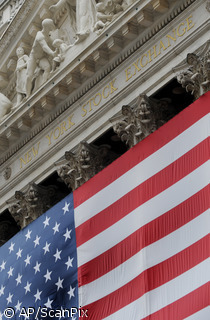It is the only source that can provide a chance for economic breakthrough
Published:
21 March 2005 y., Monday
Money from Russia’s Stabilisation Fund is expected to be invested abroad in dollar-nominated securities, with minimum investment risks and minimum profitability at 2-4%. These funds have until now been kept in Central Bank accounts. This means that a great deal of money will soon appear on the financial markets. On February 1, 2005, the Fund totaled 647.2 billion roubles ($23.1 billion), which mostly came from taxes on oil sales with prices exceeding $20 per barrel and export duties from oil companies.
The crucial question is how this money should be used. Money can only be taken out of the Fund when it has more than 500 billion roubles. Therefore, more than a fifth of its resources can already be used. This is a key issue for Russia’s economy, as the positive overseas market situation in recent years has been almost exclusively responsible for its growth.
However, experts are not tired of repeating that the potential of the resource-oriented Russian economy has been virtually exhausted. The mechanism whereby "we produce oil, sell it and enjoy the benefits" is becoming increasingly less effective. The country is now at a stage when it must introduce an industrial policy. However, any policy only makes sense when there is money to implement it.
Russia’s stock market and banking system do not provide the necessary financing for the real sector of the economy. Direct foreign investment in Russia remains at a very low level, while foreign investment in general is concentrated on either the import of equipment or foreign borrowings. The country obviously needs sources for further growth. The Stabilisation Fund is virtually the only potential source today and a genuine war is being waged for its funds.
Šaltinis:
financialexpress.com
Copying, publishing, announcing any information from the News.lt portal without written permission of News.lt editorial office is prohibited.
The most popular articles
 Thursday morning MEPs debated a report from the European Court of Auditors on EU expenditure in 2007.
more »
Thursday morning MEPs debated a report from the European Court of Auditors on EU expenditure in 2007.
more »
 Wander along any supermarket aisle and you'll see a number of two-for-one offers. It's not something we're used to seeing at our local car showroom.
more »
Wander along any supermarket aisle and you'll see a number of two-for-one offers. It's not something we're used to seeing at our local car showroom.
more »
 The leaders of the so-called Big Three of the U.S. auto industry were on the hot seat on Capitol Hill.
more »
The leaders of the so-called Big Three of the U.S. auto industry were on the hot seat on Capitol Hill.
more »
 HP today announced preliminary results for the fourth fiscal quarter 2008 with revenue of $33.6 billion, a year-over-year increase of 19% or 16% when adjusted for the effects of currency.
more »
HP today announced preliminary results for the fourth fiscal quarter 2008 with revenue of $33.6 billion, a year-over-year increase of 19% or 16% when adjusted for the effects of currency.
more »
 When the EU expanded in 2004, some of the 15 existing EU countries were worried they would be flooded by workers from eastern and central Europe.
more »
When the EU expanded in 2004, some of the 15 existing EU countries were worried they would be flooded by workers from eastern and central Europe.
more »
 Monday MEPs discussed ways to narrow the gender pay gap that still exists in Europe, despite 30 years of legislation.
more »
Monday MEPs discussed ways to narrow the gender pay gap that still exists in Europe, despite 30 years of legislation.
more »
 The financial crisis has become a major threat to the economies, jobs and lives of millions worldwide.
more »
The financial crisis has become a major threat to the economies, jobs and lives of millions worldwide.
more »
 Fisheries in the EU are regulated to protect stocks from overfishing and prevent damage to marine ecosystems.
more »
Fisheries in the EU are regulated to protect stocks from overfishing and prevent damage to marine ecosystems.
more »
 Energy prices in the EU have risen by an average of 15% in the last year and Europeans wonder whether speculators are driving up oil prices.
more »
Energy prices in the EU have risen by an average of 15% in the last year and Europeans wonder whether speculators are driving up oil prices.
more »
 Treasury Secretary Henry Paulson offered an update on the government's financial rescue efforts.
more »
Treasury Secretary Henry Paulson offered an update on the government's financial rescue efforts.
more »